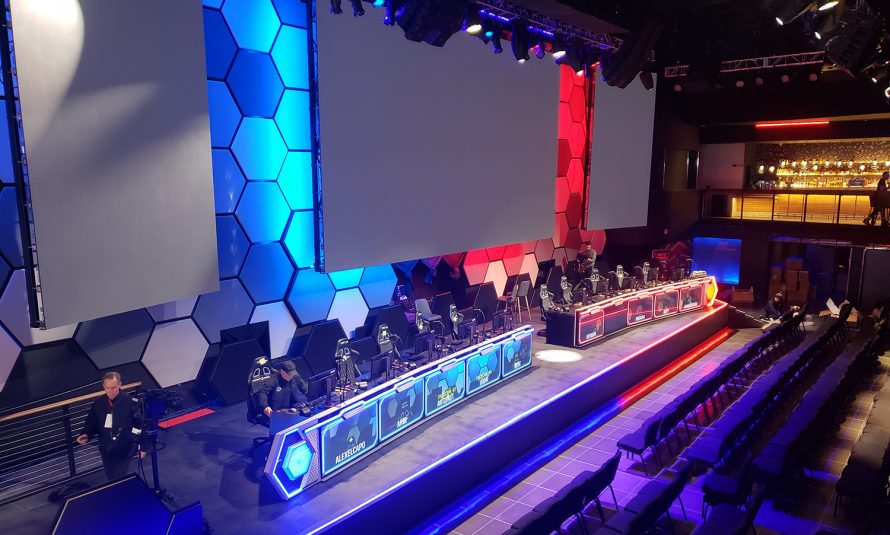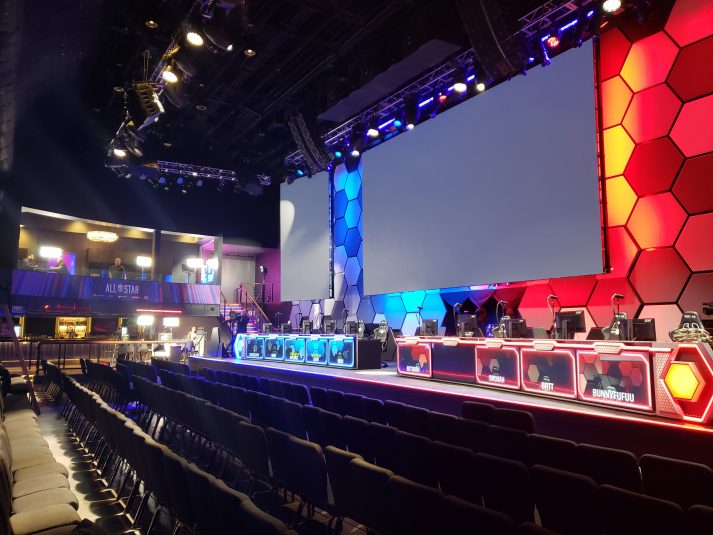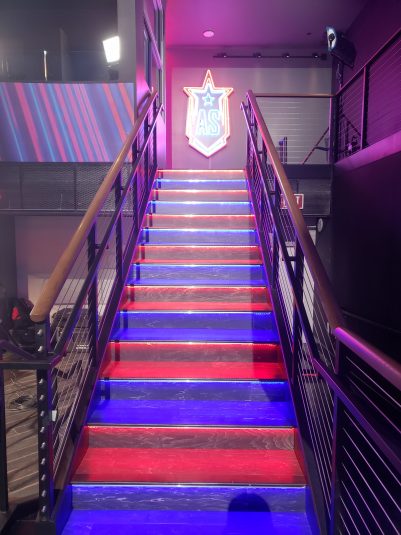Riot Games Caps Off League of Legends Season With Vegas-Style All-Star Event at HyperX Esports Arena
The production looks to emphasize fun game modes, player personalities
Story Highlights
Riot Games closes out its 2018 League of Legends campaign this week in style. Thanks to fan feedback, this year’s edition of its annual LoL All-Star event will emphasize fun over gravely serious competition, with 72 pro players and key esports influencers from across the globe participating in a range of tournaments and alternate game modes. In an effort to create this party-like atmosphere, Riot opted to shift the All-Star event from its North American LoL Championship Series (NA LCS) studio in Los Angles to HyperX Esports Arena in the party capital of the world: Las Vegas.

In an effort to create this party-like atmosphere, Riot opted to shift the LoL All-Star event to HyperX Esports Arena Las Vegas.
“Last year’s All-Star event was much more serious and competitive,” says Adam Mackasek, who serves as product lead for the event. “We learned from fan surveys that that’s not really what people want out of an All-Star event; they want it to be fun and more of a celebration of the league’s most beloved personalities. And we felt that holding it in Vegas would be a great way to [bring out] the fun nature of the event. That was the [reason] for going to HyperX Esports Arena, which has been a really good partnership.”
A Match Made in Esports Heaven: Short Timeline, Ideal Venue
Riot Games produces events at arenas and stadiums across the globe annually. Most of them are new to esports production, but the HyperX Esports Arena team is already well-versed in live esports.
“It’s really nice going to a venue where they do specifically esports, instead of having to go teach people about esports,” says Mitch Rosenthal, head of production and operations, Riot Games. “They already know what you need, and they already have [equipment] in-house to do it: player-communication systems, POV cameras for the players, the setup for the [competitors’] sleds. It’s really a turnkey solution for us.”

72 pro players and key esports influencers from across the globe will compete in a range of tournaments and alternate game modes at All-Star 2018.
Mackasek seconds that notion: “The biggest [advantage] is, we don’t have to spend time, energy, and resources teaching people why we need certain things. [It] lets our team hit the ground running and focus on delivering the show.”
HyperX Esports Arena also made sense from an internal-bandwidth perspective, given that the All-Star event takes place just a month after Riot’s colossal LoL World Championship production in South Korea. Heading to Vegas rather than to its own NA LCS studio, Riot believes, can maintain a high level of production value without overtaxing its already busy production and operations teams.
“All-Star presents a really interesting challenge for us because it falls so soon after Worlds in our calendar,” says Mackasek. “We knew [HyperX Esports Arena] would be plug-and-play for us in a lot of ways, which was very appealing considering the shorter production timeline compared with our other shows throughout the year. This way, our team had some time to recover [from Worlds], but we aren’t losing anything on the production end.”
Staying the At-Home–Production Course
Although Vegas might offer a more esports-friendly production facility, Riot Games remains committed to at-home production.
 Over the past year, the company has pushed the at-home–production envelope at major events like the World Championship and Mid-Season Invitational, home-running camera, audio, and comms feeds to a control room at its L.A. production facility. At Worlds, Riot produced not only the English-language show but also the world-feed show out of L.A., reducing the number of mobile units onsite from four in 2017 to zero this year. That trend will continue with All-Star.
Over the past year, the company has pushed the at-home–production envelope at major events like the World Championship and Mid-Season Invitational, home-running camera, audio, and comms feeds to a control room at its L.A. production facility. At Worlds, Riot produced not only the English-language show but also the world-feed show out of L.A., reducing the number of mobile units onsite from four in 2017 to zero this year. That trend will continue with All-Star.
“We’re still doing [at-home] production as we always do, and we are going to continue down that path,” says Rosenthal. “We’re bringing our REMI kit [to Last Vegas], and we’re going to home-run [feeds] back and just call the show out of our control room in L.A.”
A Very Different LoL Experience
This year’s event will feature a variety of unconventional tournaments (All-Star 1v1 Tournament, Charity 2v2 Tournament, Regional Rivalry Show Matches, and East vs. West All-Star Showdown) and Mixed-Team Alternate Game Modes, including URF (Ultra Rapid Fire), Nexus Blitz (an in-development game mode that will relaunch in January), Tandem Mode (in which one player works the mouse and another works the keyboard). Riot has also invited top esports influencers and streamers to play alongside the pros at All-Star 2018 to add a Pro-Am feel to the event.
Because the event will feature a multitude of alternate game modes, the Riot and HyperX Esports Arena production teams are thinking outside the box in terms of both onsite and live-streamed shows.
“It’s a very different [production] for us in a lot of ways,” Rosenthal explains. “[For example,] in Tandem mode, there will be 20 players on stage at a time, so that’s quite a challenge. From an audio perspective, that definitely takes some brain power to cover. Luckily, we’ve done this before, and we’re ready to go.”
Riot has added an extra Steadicam to the arena’s existing camera complement in an effort to create a more intimate feel and has also developed a new system for player comms.
Riot has rolled out an analyst desk located just to the side of the stage at HyperX Esports Arena, while the casters will utilize a remote studio desk on-site throughout the event.
“Normally, the casters are pretty removed from the audience,” says Mackasek. “For this show, we wanted them to be right in the middle of everything: first of all, because the arena’s so intimate and, second, because it’s a much more relaxed atmosphere and a more free-wheeling, fun event. We wanted to get people as close to those casters and as close to the action as we could.”
Off-stage, Riot will use the analyst studio at Esports Arena and will also have a backstage interview area in one of the VIP boxes, which look out into the arena.
Says Rosenthal, “Nothing against our [L.A.] studio, which is absolutely amazing, but being able to bring people to a new city and a new venue is very exciting for our players and fans.

